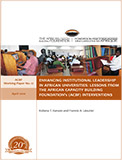
This paper draws on the extant literature and experiences of selected ACBF-supported programs to interrogate approaches to enhancing institutional leadership in African universities. The paper posits that African universities must proactively take charge of fostering institutional leadership so as to translate leadership competence into strategic assets. Such assets are key to bolstering intellectual capital, strategic scanning, i.e. the capacity to recognize the behaviour of interconnected systems to make effective decisions under varying strategic and risk scenarios, and the transformation of knowledge. To this end, African universities need to transcend their current ‘modern’ system of education to a post-modern perspective, which recognizes context, collaboration and knowledge as valued skills. Enhancing institutional leadership is also crucial if Africa is to compete in today’s rapidly globalizing world and knowledge society. More importantly, doing so has direct impact on shaping the quality of leadership on the Continent, and consequently the resulting policy decisions and governance. The paper concludes that while institutional, political, demographic as well as resource challenges exist, African universities today, are uniquely positioned as a result of uptake of knowledge management, strengthened private public partnerships and advances in ICT to enhance institutional leadership





